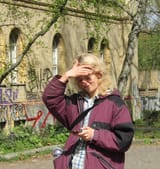NZIFF 2025 Craccum Coverage | Magic Farm
Anarchic, complicated, and heart-wrenching, Magic Farm is a satirical film by Amalia Ulman, now screening for the 2025 NZIFF.

Magic Farm revolves around a group of edgy, VICE-adjacent media journalists who have been producing content for a short-form series. Chloe Sevingy's Edna, notable frontwoman of this crew, has been reporting on 'strange subcultures' throughout the world. For the next instalment of this series, her crew is set to hunt down a rabbit-costumed pop group in the Argentinian town of San Cristobal. However, when the team arrives on location, it's apparent juvenile producer Jeff has made a fuck-up; they've gone to the wrong town. The meat of Magic Farm centres on the team's attempts to remediate this mistake: the desperate fabrication of a story to placate their conscience, bosses, and followers.
Culture clash and Western ignorance come to a front in Magic Farm. Edna, Elena, Jeff, and Justin are detached from the culture and community they are surrounded by, never wholly paying attention or looking outside themselves. Argentina is a suspended, alternate reality to their lives in New York. The people aren't real; the town isn't real. Jeff's relationship with local Manchi is a clear manifestation of this. She's a throw-away fling, low-stakes entertainment while he is away from his 'explosive' new relationship back home. The Yankee crew are complacent and entitled. They spend cash lavishly, exploit the locals' time, culture, and image, and strut around in Tabis.
An obvious, severe crisis is at play in San Cristobal, ironically going unnoticed by the Americans. The town is close to soy fields, which are routinely crop-dusted with Glyphosate, a toxic herbicide. This is markedly impacting the community, and has been for a while: we overhear numerous discussions of adolescent cancer, of reproductive defects, of respiratory issues. The crew see the spraying up-close, hear the hotel Receptionist link the compound to his speech impediment, and witness an English radio broadcast explicitly outlining its dangers. They remain ignorant.
The Glyphosate crisis in Magic Farm is a real one – in the 80s, Ulman's Argentinian relatives had to leave their town when faced with the effects of agricultural pollution. Many of these people were indigenous, having to leave a place of strong cultural significance, their relationship to the land and long-established systems compromised. Some stayed, sacrificing their health and their able bodies. There was minimal media coverage, minimal activism – the locals were powerless, unseen.
Magic Farm makes you feel uneasy on many levels. Something I did not expect was Justin's deeply affecting, gay fling with the hotel receptionist. This relationship was a surprising facet to Magic Farm: it was strangely, pleasantly mutual, both exploitative and earnest, and still doomed to end as Justin and the others departed San Cristobal. Watching them say goodbye was a little tragic. Having no way or reason to communicate, the pair's lives would diverge, each left to imagine or abstract the other's future, to let their memory distort or decay. Thinking about what the relationship would mean for the Receptionist was especially disquieting. Justin's life (and love life) would continue abroad in New York, gay mecca, his mental image of San Cristobal and the Receptionist remaining intact. Conversely, the Receptionist would be stuck in his small town, his health (and his son's) rapidly deteriorating from the effects of Glyphosate. What comes next for San Cristobal?
I liked Magic Farm a lot. Ulman's background in contemporary art is really interesting, something that definitely came through in this film. A recommended watch, and director to follow!





